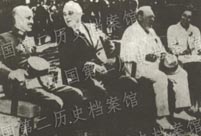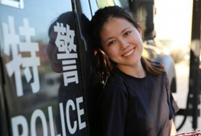 YOG kicks off in Nanjing
YOG kicks off in Nanjing
 Colorful life at Youth Olympic Village of Nanjing 2014 YOG
Colorful life at Youth Olympic Village of Nanjing 2014 YOG
 Royal Taoist temple to open to public
Royal Taoist temple to open to public
 Female soldiers at quake-hit area
Female soldiers at quake-hit area
 Shocking photos of cruel battles in Ukraine
Shocking photos of cruel battles in Ukraine
 Amphibious armored vehicle unit conducts open sea drill
Amphibious armored vehicle unit conducts open sea drill
 Water relay in Henan
Water relay in Henan
 Ethnic culture feasts eyes of travelers
Ethnic culture feasts eyes of travelers
 80 security dogs assembled in Nanjing police dog training base
80 security dogs assembled in Nanjing police dog training base
 Graffiti artists paint on street walls in Xinjiang
Graffiti artists paint on street walls in Xinjiang
Armies of children and teenagers wielding swords and staves flip and cartwheel and duel against each other in flagstone courtyards.
Founded in 1978, Tagou's schools now boast 32,000 students at several locations in China, providing "Shaolin style" wushu as a core syllabus subject for Chinese youths. Since 2007 it has also provided lodging and lessons for about 200 foreign students annually, at a rate of about $10,000 a year.
Liu candidly acknowledges that the company runs a business that focuses on education and specializes in practical kung fu.
"A lot of our graduates go on to be very successful in business," he says. "I think wushu gives them the strength and confidence that they need."
Tagou's effectiveness is being taken seriously by Chinese policymakers, and it is part of the reason why the central government is now considering making kung fu a subject available at State schools nationwide.
Abbot Shi generally shies away from talking about the commercial successes of Shaolin and why he has taken the order down a path that has led to financial sustainability.
But reading between the lines, when he opens up about his own journey to enlightenment, reveals much about the man and his mission.
Born in Anhuiprovince, the son of a train driver, Shi arrived at Shaolin Temple in 1981 when he was 16 years old. He found the place in disrepair. The monks, he says, "didn't have enough to eat".
"At that time, Shaolin didn't have so many visitors. The temple buildings were in poor condition, and more than 30 monks lived off 1.9 hectares of farmland. The conditions were harsh, and life was tough."
Starting in 1987, Shi was able to help steer the future course of the order. In 1999 he became the abbot, and his reform agenda picked up pace.
"For 1,500 years, our belief, our way of practicing Buddhism has not changed," he says. "But our daily work has changed. Historically, monks lived off farming. Now they mainly work by serving tourists. We used to deal with farmlands, but now we deal with people, which is not that easy."
Shi Yanbo, 25, is part of the new generation of novice monks at Shaolin. He believes going back to the old ways makes no sense.
"Tourists are a test of our xiuxing (journey to enlightenment) because we have to make sure that our heart won't be affected by the noisy environment," he says.
"We have to accept it and remain calm and treat visitors with joyful hearts. Shaolin belongs to the world now, and develops with the world. We cannot do farming; otherwise, people would be unable to visit us. All our traditional thoughts and beliefs have been maintained and carried on for generations. Our life may be different, but what we practice is of the heart, and the heart remains unchanged."
On the ancient battleground, or in the modern boardroom, Shi says wushu is about more than physical prowess. It is about mental discipline and the Buddhist drive for constant self-improvement, personal and professional.
As the sun disappears behind the forest-clad Songshan mountain, the tourists empty out of Shaolin Temple. The monks sit quietly and chat beneath swooping squadrons of dragonflies in the gathering twilight, a window into a simpler time before kung fu became commercial.
The abbot says the temple's growing connectivity with the modern world is about survival, and about spreading the benefits of Shaolin wushu to those who are seeking it, globally.
He hints that the kung fu wisdom he shares with executives is not just about people wanting to do better in business, but also about people who have done well in business, wanting something better.
"I tell businesspeople how to behave in a good way, how to do things well," Shi says. "They need to be more confident, improve themselves, keep a normal heart toward things and believe that you reap what you sow."
In the ancient mountain fastness of Shaolin Temple, walking in the footsteps of generations of kung fu acolytes, Masoula says she believes the soul of the ancient order has not been subverted and turned into a business with a focus on profit. Perhaps, she says, it is a case of kung fu in the 21st century giving business a new focus, and the wisdom to recognize that there is profit in having a soul.
 |
 Eye-catching guides at the opening ceremony of YOG in Nanjing
Eye-catching guides at the opening ceremony of YOG in Nanjing A female missile launch company of PLA
A female missile launch company of PLA China, the U.S., Britain and the Soviet Union call for Japan's unconditional surrender
China, the U.S., Britain and the Soviet Union call for Japan's unconditional surrender Beautiful night scenery of Nanjing
Beautiful night scenery of Nanjing Passenger transport starts on Tibet's new railway
Passenger transport starts on Tibet's new railway Story of outstanding Beijing swat sniper
Story of outstanding Beijing swat sniper Beautiful policewoman in an anti-terrorism SWAT team
Beautiful policewoman in an anti-terrorism SWAT team Cute photos of little Taoist nuns and monks go viral online
Cute photos of little Taoist nuns and monks go viral online Photo story: How a baby panda grows up
Photo story: How a baby panda grows up Star-leveled nursing home in a small county
Star-leveled nursing home in a small county Evidence of monstrous crime of Japanese invaders
Evidence of monstrous crime of Japanese invaders Foreign models compete with Chinese in Cheongsam show
Foreign models compete with Chinese in Cheongsam show The beautiful pictures of ancient Chinese architecture
The beautiful pictures of ancient Chinese architecture The Muslims involved in relief work
The Muslims involved in relief workDay|Week|Month